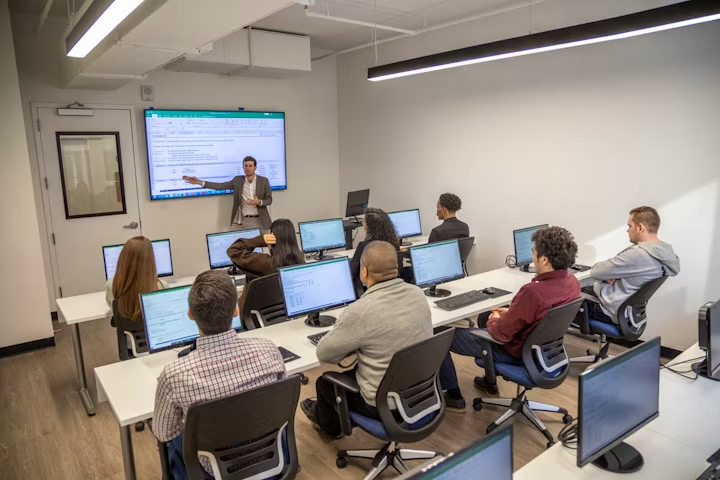The Institute of Avionics & Aeronautics is a premier institution dedicated to advancing the fields of aviation and aerospace through cutting-edge education, research, and innovation. As the aviation industry continues to evolve with technological advancements and growing global demands, this institute stands at the forefront, preparing the next generation of engineers, pilots, and aviation professionals to navigate the skies and beyond.
The Importance of Avionics and Aeronautics
Avionics and aeronautics are critical to the modern world, enabling global connectivity, national defense, and space exploration. Avionics focuses on the electronic systems used in aircraft, satellites, and spacecraft, while aeronautics deals with the science and engineering of flight. Together, these fields drive innovation in aviation safety, efficiency, and sustainability, making them indispensable to the future of transportation and exploration.
Mission and Vision of the Institute of Avionics & Aeronautics
The Institute of Avionics & Aeronautics is committed to excellence in education, research, and industry collaboration. Its mission is to:
- Educate Future Leaders: Provide students with a strong foundation in avionics, aeronautics, and aerospace engineering.
- Advance Research and Innovation: Conduct groundbreaking research that addresses the challenges and opportunities in aviation and aerospace.
- Foster Industry Partnerships: Collaborate with leading aviation and aerospace organizations to bridge the gap between academia and industry.
- Promote Sustainability: Develop technologies and practices that enhance the sustainability of aviation and aerospace operations.
Key Programs and Specializations
The Institute of Avionics & Aeronautics offers a wide range of programs tailored to meet the needs of students and professionals. Some of the key programs include:
1. Aerospace Engineering
This program focuses on the design, development, and testing of aircraft, spacecraft, and related systems. Students gain expertise in aerodynamics, propulsion systems, and structural analysis.
2. Avionics Engineering
Avionics engineering deals with the electronic systems used in aviation, such as navigation, communication, and flight control systems. This program emphasizes the integration of hardware and software for reliable and efficient aircraft operations.
3. Aircraft Maintenance Engineering
This program trains students in the maintenance, repair, and overhaul of aircraft systems. It covers areas such as airframe structures, powerplants, and avionics systems.
4. Pilot Training
The institute offers comprehensive pilot training programs, including private pilot license (PPL), commercial pilot license (CPL), and airline transport pilot license (ATPL). Students receive hands-on training in state-of-the-art flight simulators and actual aircraft.
5. Space Science and Technology
This program explores the design and operation of spacecraft, satellites, and space missions. It covers areas such as orbital mechanics, space propulsion, and satellite communications.
6. Unmanned Aerial Systems (UAS)
With the growing use of drones, this program focuses on the design, operation, and regulation of unmanned aerial systems. Students learn about drone technology, remote sensing, and applications in industries such as agriculture, logistics, and surveillance.
Research and Innovation
The Institute of Avionics & Aeronautics is at the forefront of research that addresses critical challenges in aviation and aerospace. Its research centers and initiatives focus on areas such as:
- Sustainable Aviation: Developing technologies to reduce carbon emissions and noise pollution in aviation.
- Advanced Materials: Researching lightweight and durable materials for aircraft and spacecraft.
- Autonomous Systems: Exploring the use of artificial intelligence and machine learning in autonomous flight systems.
- Space Exploration: Contributing to space missions and satellite technology for scientific and commercial purposes.
- Aviation Safety: Enhancing safety through advanced avionics systems, predictive maintenance, and human factors research.
State-of-the-Art Facilities
The Institute of Avionics & Aeronautics provides students and researchers with access to world-class facilities that enhance learning and innovation. These include:
- Flight Simulators: High-fidelity simulators for pilot training and research in flight dynamics.
- Wind Tunnels: Facilities for testing aerodynamic performance of aircraft and spacecraft models.
- Avionics Labs: Equipped with advanced tools for designing and testing electronic systems.
- Aircraft Hangars: Spaces for hands-on training in aircraft maintenance and repair.
- Research Centers: Dedicated spaces for interdisciplinary research in aviation and aerospace.
Collaborations and Industry Partnerships
The Institute of Avionics & Aeronautics collaborates with leading aviation and aerospace organizations to ensure that its programs and research have a real-world impact. These partnerships include:
- Aerospace Companies: Working with industry leaders such as Boeing, Airbus, and Lockheed Martin on research and development projects.
- Government Agencies: Partnering with organizations such as NASA, the Federal Aviation Administration (FAA), and the European Space Agency (ESA).
- Airlines and Aviation Operators: Collaborating with airlines and aviation service providers to address operational challenges and improve efficiency.
- Academic Institutions: Engaging in joint research initiatives and exchange programs with top universities worldwide.
Career Opportunities for Graduates
Graduates of the Institute of Avionics & Aeronautics are highly sought after in various sectors of the aviation and aerospace industry. Some of the key career paths include:
- Aerospace Engineering: Roles in aircraft and spacecraft design, testing, and manufacturing.
- Avionics Engineering: Careers in the development and maintenance of electronic systems for aviation.
- Piloting: Opportunities as commercial pilots, flight instructors, and airline captains.
- Aircraft Maintenance: Positions in aircraft maintenance, repair, and overhaul (MRO) services.
- Space Science: Careers in space exploration, satellite technology, and space mission planning.
- Research and Academia: Opportunities to conduct research and teach at universities and research institutions.
The Future of Avionics and Aeronautics
As the aviation and aerospace industries continue to evolve, the Institute of Avionics & Aeronautics is committed to staying at the forefront of innovation by:
- Embracing emerging technologies such as electric propulsion, autonomous systems, and advanced materials.
- Addressing global challenges such as climate change, air traffic management, and space exploration.
- Promoting diversity and inclusion to ensure that the aviation and aerospace workforce reflects the communities it serves.
- Fostering a culture of curiosity, creativity, and ethical responsibility.
Conclusion
The Institute of Avionics & Aeronautics is more than just an academic institution; it is a hub of innovation, discovery, and impact. By equipping students with the knowledge and skills to navigate the complexities of aviation and aerospace, the institute is shaping the next generation of engineers, pilots, and leaders who will drive progress and exploration in the skies and beyond. Whether you’re passionate about designing cutting-edge aircraft, piloting the next generation of airliners, or exploring the frontiers of space, the Institute of Avionics & Aeronautics offers the perfect platform to turn your dreams into reality.



